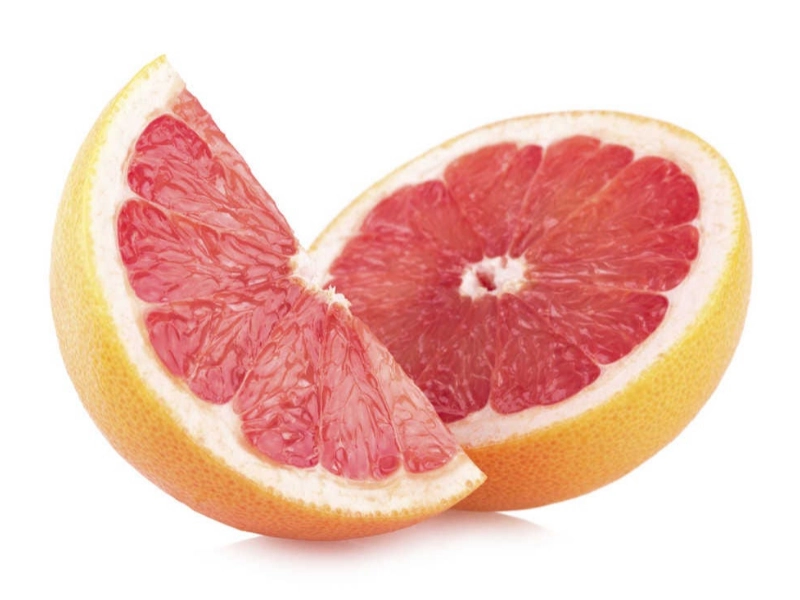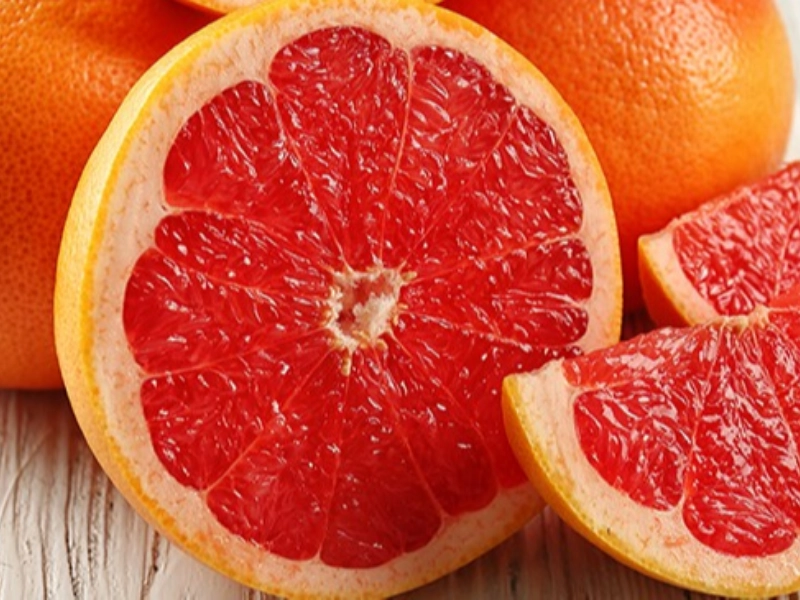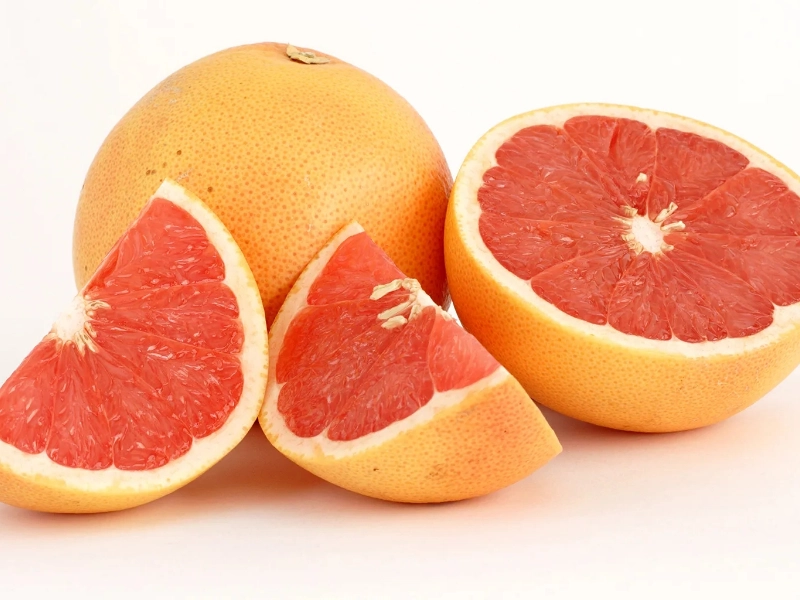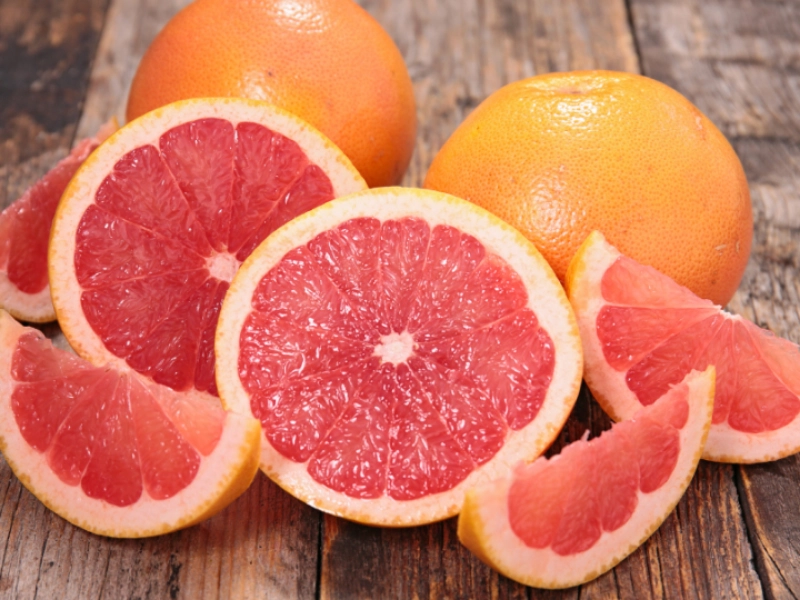More than half of a grapefruit meets the daily requirement for vitamin C. It's also a good source of fibre and potassium. A combination of minerals found in the bitter citrus fruit promotes healthy weight loss and may help avoid diabetes. It has high levels of potassium, vitamin C, and soluble and insoluble fibre.

 Citrus paradisi Macfad, or grapefruit, is a tart citrus fruit that is high in dietary fibre. More than half of your daily requirement of vitamin A, which is crucial for the immune system and visual health, may be found in one medium grapefruit.
Grapefruit is a fantastic option for those monitoring their blood glucose levels because of its low glycaemic index (GI), which prevents blood sugar spikes. Additionally, if you have type 2 diabetes, controlling your blood sugar levels may be aided by eating a diet high in whole foods and fruits, such as grapefruit.
Vitamin C, magnesium, potassium, and folate intakes are greater in grapefruit eaters than in non-consumers, and a larger proportion of their diets consist of fruits and vegetables. Additionally, they are less prone to eat foods that should be limited, like added sweets and saturated fat. (The NHANES 2003–2008 provided the data.)
Citrus paradisi Macfad, or grapefruit, is a tart citrus fruit that is high in dietary fibre. More than half of your daily requirement of vitamin A, which is crucial for the immune system and visual health, may be found in one medium grapefruit.
Grapefruit is a fantastic option for those monitoring their blood glucose levels because of its low glycaemic index (GI), which prevents blood sugar spikes. Additionally, if you have type 2 diabetes, controlling your blood sugar levels may be aided by eating a diet high in whole foods and fruits, such as grapefruit.
Vitamin C, magnesium, potassium, and folate intakes are greater in grapefruit eaters than in non-consumers, and a larger proportion of their diets consist of fruits and vegetables. Additionally, they are less prone to eat foods that should be limited, like added sweets and saturated fat. (The NHANES 2003–2008 provided the data.)
 Citrus fruits like grapefruit are prized for their vivid colours and zesty taste. It's also a fantastic way to get essential nutrients. Five percent of the daily potassium intake, which is important for heart health, can be found in half a grapefruit. Potassium-rich diets can enhance vascular outcomes, such as decreasing cholesterol, and lower blood pressure.
Grapefruit's antioxidants are beneficial to heart health as well. They might aid in lowering inflammation and preventing hypertension. They might also offer defence against disorders of the eyes, such as macular degeneration. Grapefruit fibre can help the digestive system by fostering the growth of good bacteria and reducing constipation.
The NHANES states that eating grapefruit on a daily basis can be a good way to get potassium, magnesium, and vitamin C. It can also provide a reasonable quantity of beta-carotene, thiamine, and folate. Mancella cautions consumers against consuming grapefruit juice, particularly the commercially pressed kinds that include added sugar.
Citrus fruits like grapefruit are prized for their vivid colours and zesty taste. It's also a fantastic way to get essential nutrients. Five percent of the daily potassium intake, which is important for heart health, can be found in half a grapefruit. Potassium-rich diets can enhance vascular outcomes, such as decreasing cholesterol, and lower blood pressure.
Grapefruit's antioxidants are beneficial to heart health as well. They might aid in lowering inflammation and preventing hypertension. They might also offer defence against disorders of the eyes, such as macular degeneration. Grapefruit fibre can help the digestive system by fostering the growth of good bacteria and reducing constipation.
The NHANES states that eating grapefruit on a daily basis can be a good way to get potassium, magnesium, and vitamin C. It can also provide a reasonable quantity of beta-carotene, thiamine, and folate. Mancella cautions consumers against consuming grapefruit juice, particularly the commercially pressed kinds that include added sugar.
 The body uses antioxidants as a natural defence against poisons. They may potentially limit the growth of cancer cells in addition to combating free radicals. Antioxidants not only prevent oxidative damage but also improve nutritional absorption, including potassium and vitamin C.
While every hue of grapefruit is rich in antioxidants, lycopene content is highest in the pink and red kinds. The brilliant colours of these fruits are caused by this phytochemical.
Consumers of grapefruit were more likely than non-consumers to meet the necessary consumption of magnesium and vitamin C. Furthermore, there was a higher probability of their fulfilling the suggested consumption of dietary potassium and fibre. Additionally, consumers of grapefruit had higher-quality diets. This might have affected the variations in anthropometric and physiological measurements that were noted between the groups. The effects of different diet quality on grapefruit intake and health outcomes should be investigated in future studies. The possibility of medication interference is decreased when pasteurised grapefruit juices are used to remove the coumarins.
The body uses antioxidants as a natural defence against poisons. They may potentially limit the growth of cancer cells in addition to combating free radicals. Antioxidants not only prevent oxidative damage but also improve nutritional absorption, including potassium and vitamin C.
While every hue of grapefruit is rich in antioxidants, lycopene content is highest in the pink and red kinds. The brilliant colours of these fruits are caused by this phytochemical.
Consumers of grapefruit were more likely than non-consumers to meet the necessary consumption of magnesium and vitamin C. Furthermore, there was a higher probability of their fulfilling the suggested consumption of dietary potassium and fibre. Additionally, consumers of grapefruit had higher-quality diets. This might have affected the variations in anthropometric and physiological measurements that were noted between the groups. The effects of different diet quality on grapefruit intake and health outcomes should be investigated in future studies. The possibility of medication interference is decreased when pasteurised grapefruit juices are used to remove the coumarins.